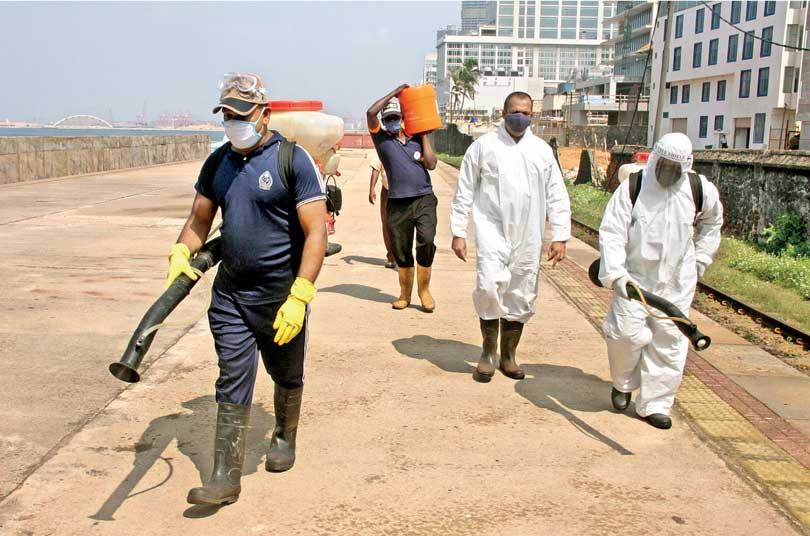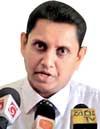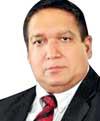Reply To:
Name - Reply Comment
 There must be responsibility and accountability from the part of the authorities when meeting the new challenges posed by the pandemic
There must be responsibility and accountability from the part of the authorities when meeting the new challenges posed by the pandemic
PIC BY PRADEEP DILRUKSHANA
 With 21 deaths and 6065 active cases (as at November 2) Sri Lanka is experiencing another one of those troubled times. However, unlike in a war the enemy is common to all and more medical. Therefore battling it requires adequate technical guidance and support. Delayed PCR results, administrative issues, ball games and ego issues will certainly not do any good at this critical juncture. While the public have been urged to place their trust in the healthcare services, certain discrepancies also emerged over the past few days; much to the dismay of the public.
With 21 deaths and 6065 active cases (as at November 2) Sri Lanka is experiencing another one of those troubled times. However, unlike in a war the enemy is common to all and more medical. Therefore battling it requires adequate technical guidance and support. Delayed PCR results, administrative issues, ball games and ego issues will certainly not do any good at this critical juncture. While the public have been urged to place their trust in the healthcare services, certain discrepancies also emerged over the past few days; much to the dismay of the public.
Hence the Daily Mirror sheds light on the issues at hand and the assurance given by authorities to rectify issues as soon as possible.
There have been certain delays due to the lack of hospital beds during the past few days. However, we inform the patient and his family that an ambulance will arrive to take them to the hospital
Upul Rohana
Lack of coordination
According to Upul Rohana, Public Health Inspectors (PHIs) Union President, PHIs are vested with several tasks from arranging PCR tests, taking samples, detecting positive cases from reports and informing the Provincial Health Services Office. “Thereafter they coordinate with the nearest hospital and depending on the availability of beds, the patients will be taken. There have been certain delays due to the lack of hospital beds during the past few days. However, we inform the patient and his family that an ambulance will arrive to take them to the hospital,” said Rohana.
He further said that there are over 400 vacancies for PHIs that have not been filled. “Although we have a cadre of 1850 PHIs, only 1200 are working on the field. A coordination issue also exists where guidelines haven’t been properly laid out. There’s lack of communication between the hierarchy and field level healthcare workers,” he said.
PCR testing, bed capacity are limiting factors
With a new Deputy Director General of Laboratory Services appointed, health authorities are looking at speeding up the PCR testing capacity within this week. Government Medical Officers’ Association Editor Dr. Haritha Aluthge said that they observed an attitudinal issue with regard to PCR testing. “The responsibility was passed onto the Epidemiology Unit. The Epidemiology Unit repeatedly said that a minimum buffer stock is needed.
There was a huge delay in issuing results. We have identified three key issues with regard to PCR testing. One is the capacity. This has to be expanded and a 100,000 buffer stock needs to be maintained. The daily capacity has to be enhanced by giving testing to private hospitals. When conducting PCR tests locally the local cadre has to be incentivized and such administrative issues also have to be looked into. The third is quality assurance. There has to be an accreditation process even by consulting international experts and standardize lab facilities.” said Dr Aluthge.
He further said that some of the limiting factors that have been identified include PCR testing and bed capacity. “The Health Ministry also made some changes in the discharge criteria for asymptomatic, mildly asymptomatic and patients with moderate or severe illnesses. So both asymptomatic and mildly asymptomatic patients will be discharged if they don’t show any symptoms after the first PCR test has been done. This is because they are considered as non-infectious.”
he added.
When asked about the issue regarding ventilators, Dr. Aluthge said that it’s better to keep ventilators ready, given the complications and mortality rate. “So far only four or five patients have required ICU bed facilities. We restricted the deaths up to nine, but suddenly we see a rise (in patients abd deaths) over the past few weeks. The new strain is expected to double the number of deaths globally. So we have to keep ICU facilities ready.” Dr. Aluthge affirmed.
He also requested patients to go for routine checkups to other hospitals which are carrying out normal operations. “Except for a selected number of specialised centres, patients with diabetes, heart attacks and other illnesses can go and get their checkups done. There’s a new criterion for pregnant and post partum mothers as well. They can use their pregnancy book as a curfew pass. Likewise we have mobilised resources in case of an emergency,”
he said.
When asked about dealing with parents and children during COVID-19 he said that some guidelines need to be in place for lactating mothers, children under the age of five and children with special needs. “Social support is required at a time like this. We will discuss this and workout a guideline in the coming few days,” he assured.

Social support is required at a time like this. We will discuss this and workout a guideline in the coming few days
Dr. Haritha Aluthge
Privacy and confidentiality ignored?
Recently, more issues pertaining to PCR testing were exposed by a few individuals who were undergoing quarantine. It was not only revealed that the PCR machine was malfunctioning, but some PCR samples were misplaced as well. Taking to social media, Family Physician practicing in UK and Sri Lanka, Dr. Tush Wickramanayake revealed how her PCR sample was taken, but how it hadn’t reached the Medical Research Institute. Relating her experience on a live video, she said that although the names had reached the testing centre, the comment against her name read ‘No sample’. Apart from that the Army had requested them to conduct PCR tests privately.
Speaking to the Daily Mirror, Dr. Wickramanayake said that the key to identifying patients is to ensure the whole testing, contact tracing and medical care are done on strictly private and confidential basis without exposing individuals to the media. “The Army Commander Shavendra Silva, who is the Head of the COVID Special Task Force, issued a statement that the “entire quarantine process is handled by the Armed Forces”. Therefore, it is the sole responsibility and accountability of the SL Army to ensure an efficient and reliable process from collection of sample to delivery of the result. They cannot pass the buck to the civil services and dismiss their overall responsibility. They must follow a simple checklist process and a foolproof safety netting mechanism to identify and rectify any mistakes immediately without penalising the individual. This process needs to be transparent for trust to be built.
The more mistakes that occur and more time is taken to resolve it or when transparency is lacking, it is inevitable that the support and trust are lost from a citizen’s perspective. This can lead to an escalation of complaints, which could damage the morale of the workforce and management of limited resources,” she added.
She further said that authorities should ensure total privacy and confidentiality of individuals. “Implement Government-recommended COVID rules for every individual with honesty and transparency. Take total responsibility and be accountable when things go wrong without passing the buck, shaming or blaming citizens.” she said.
Social security system needs to be developed
Recently a teenager committed suicide when his mother was being taken away for quarantining. Although it sparked much fury on social media, adhering to quarantine regulations and preventing the transmission of the virus are also of paramount importance at this critical hour. Responding to the incident, Dr. Chithramalee De Silva, Director at Family Health Bureau said that a holistic approach is required when it comes to dealing with children with special needs. “For this the divisional secretariat and many other authorities need to work together. We need to develop a social security system. But there have been a lot of cases that were attended to on an individual basis and we have been successful in these approaches,” said Dr. De Silva.
Suwaseriya Ambulance Service continues its untiring efforts
The 1990 Suwaseriya Ambulance service has continued to extend its services, taking patients for PCR testing, taking COVID-19 positive patients, suspected cases, patients with other emergencies with a staff contributing their maximum effort at this critical hour. So far 297 ambulances manned by a staff of 1400 individuals continue to meet the demands of patients, island wide.
Speaking to the Daily Mirror, Suwaseriya Ambulance Service’s Chief Executive Officer Sohan De Silva said that some of the staff is working at the call centre and are first and second contacts of infected people in their areas of residence. “We have four teams working and two teams are at call centres. But the staff is quite dedicated that they have volunteered to work even while on home quarantine. For that we have provided them with the laptops and connections. Another team is handling the emergency operation where the teams are working on a rotational basis to avoid infection. They have been working 17-18 hours per day and handling around 1000 cases.” said De Silva.
“Apart from that I also have to mention the support extended by the field staff in the frontline. They include the Emergency Medical Technicians, pilots, district-in-charge officers, regional managers, fleet team and the quality assurance team,” he added.
De Silva further said that it is the patient and the ambulance staff that are in the ambulance. “The staff has to adhere to health guidelines and have to wear the personal protective gear and disinfect the ambulance before taking a new patient in. Suwaseriya is continuing to provide services to emergency cases. We are handling normal emergencies and in the event of a special situation we will bring down ambulances from other areas as well,” said De Silva.

Another team is handling the emergency operation where the teams are working on a rotational basis to avoid infection
Sohan De Silva
No issues with PCR testing, bed capacity or ventilators
However when contacted, Health Ministry Media spokesperson Dr. Jayaruwan Bandara said that so far the hospital bed capacity is sufficient and that there had been no complaints about capacity running out. When asked if there’s a risk of a positive patient remaining at home he responded in the affirmative, but stressed on the fact that some may be asymptomatic.
He further said that the delayed PCR results will be issued within this week and a mechanism is in place to increase capacity and deliver results on the same day.
When inquired about the issue of ventilators National Institute of Infectious Diseases Head, Dr. Ananda Wijewickrama said that there are enough ventilators at the moment.
Several attempts made to contact the Army Commander Shavendra Silva regarding the PCR samples proved futile.
